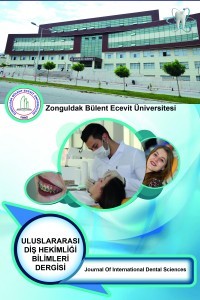Kazanılmış Bir Maksiller Defektin Yumuşak Astar Materyali ve Obtüratörle Tedavisi
Obturatör, Maksiller Rezeksiyon, Protetik Rehabilitasyon
Treatment of an Acquired Maxillary Defect with Soft Lining Material and Obturator Prothesis
Obturator, Maxillary Resection, Prosthetic Rehabilitaton,
___
- 1. Adisman IK. Prosthesis servicability for acquired jaw defects. Dent Clin North Am 1990; 34: 265-84.
- 2. 3. Shah RJ, Katyayan MK, Katyayan PA, Chauhan V. Prosthetic rehabilitation of acquired maxillary defects secondary to mucormycosis: clinical cases. J Contemp Dent Pract 2014;15:242-9.
- 3. Keyf F. Review: Obturator prostheses for hemimaxillectomy patients. J Oral Rehabil. 2001; 28: 821–9.
- 4. Pinto JHN, Pegoraro-Krook MI. Evaluation of palatal prosthesis for the treatment of velopharyngeal dysfunction. J Appl Oral Sci. 2003; 11: 192–7.
- 5. Kurtoğlu C, Uzel Ġ. GeçmiĢten Bugüne Yüz Protez Materyalleri. CÜ DiĢ Hek Fak Derg 2008;11:140-4.
- 6. . Wolfaardt JF, Chandler HD, Smith BA. Mechanical properties of a new facial prosthetic material J Prosthet Dent 1985;53:228-34.
- 7. Farah JW, Robinson JC, Koran A, Craig RG, Hood JA. Properties of a modified cross-linked silicone for maxillofacial prostheses. J Oral Rehab 1987;14:599-602. 8. Mugan N, Tuncer EB, Keskin H, Özdemir T. İki burun epitezi. İst Ünv Diş Hek Fak Derg 1979;12:281-3. 9. Doğan OM. Yumuşak astar materyallerin klinik endikasyonları. Atatürk Üniv Diş Hek Fak Derg2005;15(1):70-75. 10. Meşe A, Güzel K. Effect of storage duration on the hardness and tensile bond strength of silicone- and acrylic resin-based resilient denture liners to a processed denture base acrylic resin. J Prosthet Dent 2008;99:153-159.
- 11. Bianchi B, Copelli C, Cocchi R, Ferrari S, Pederneschi N, Sesenna E. Adenoidcystic carcinoma of intraoral minor salivary glands. Oral Oncol 2008;44(11):1026-31.
- 12. Goodwin L. Adenoid cystic adenocarcinoma of a minor salivary gland--an under-estimated risk? J Insur Med 2004;36(4):339-40.
- 13. Jain VS, Singh KK, Sachdeva Y. A case of adenoid cystic carcinoma parotid with perineural spread. MJAFI 2007;63(1):67-8.
- 14. Çalıkkocaoğlu S. Tam protezler. Üçüncü baskı. İstanbul: Teknografik Matbaacılar Sitesi; 1998. p. 677-688.
- 15. Anusavice KJ. Phillips’ Science of Dental Materials. Philadelphia: W.B. Saunders Company, 2006.
- 16. Council on Dental Research : Resilient Liners, J.A.D.A., 67 : 558-562, 1963.
- 17. Craig, G.R.: Restorative Dental Materials, 9th. ed., The C.V. Mosby Co., St Louis, 1963.
- 18. Kawano, F., Dooz, E.R., Koran, A., Craig, R.G.: Comparison of bond strength of six soft denture liners to denture base resin, J. Prosthet. Dent., 68 (2) : 368-371, 1992.
- 19. Turfaner M, Kutay Ö. Günümüzde protezler için kullanılan yumuşak astar maddeleri, MÜ Diş Hek Fak Derg 1987; 3: 50-59.
- 20. Anderson J N. Applied Dental Materials. 5th ed., London: Blackwell Scientific Publications; 1977, 277- 280.
- 21. Mccabe J F, Walls A W G. Applied Dental Materials. 8th ed, U.K :Blackwell Science;2000,108-114.
- 22. Uzun G, Çelebi N. Yumuşak astar materyallerinin fiziksel özellikleri. Hacettepe diş hekimli.i fakültesi dergisi 1999; 23: 18-22.
- 23. Kawano F, Kon M, Koran A, Graig RG. Shockabsorbing of four processed soft denture liners. J Prosthet Dent 1994;72:599-605.
- 24. Wright PS. The success and failure of denture soft lining materials in clinical use. J Dent1984; 12: 319- 27.
- 25. Noort RV. Introduction to Dental Materials. London: Mosby St Lois;1994, 189-190.
- 26. O’brien J W. Dental materials and their selection. 2nd ed, Chicago: Quintessence Pub Co;1997.
- 27. Bascom PW. Resilient denture base materials. J Prosthet Dent 1966;16:646-649.
- ISSN: 2149-8628
- Yayın Aralığı: Yılda 3 Sayı
- Yayıncı: Zonguldak Bülent Ecevit Üniversitesi
Çenelerde Gözlenen Kompleks Ve Kompaund Odontomalar: Olgu Serisi
Esengül ŞEN, Sefa ÇOLAK, Elif ÇETİN
Kazanılmış Bir Maksiller Defektin Yumuşak Astar Materyali ve Obtüratörle Tedavisi
Kompleks Odontoma: Bir Olgu Sunumu
Fatmanur KETENCİ, Rüştü GEDİK, Ömer Fahrettin Göze GÖZE
Olcay ÖZDEMİR, Ecehan HAZAR, Sibel KOÇAK, Mustafa Murat KOÇAK, Baran Can SAĞLAM
Polidiastema Vakasının Multidisipliner Yaklaşımla Direkt Olarak Rehabilitasyonu
Mevlüt Emre SÖNMEZATEŞ, Seckin Onur AKARKEN, Aydın DENİZ, Nurcan OZAKAR ILDAY
